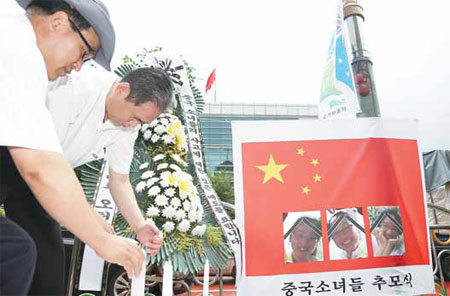Air crash payouts could differ
|
People pay tribute to three Chinese students killed in the Asiana air crash in San Francisco on July 6, in Seoul on Monday. Provided to China Daily |
US citizens on Flight 214 expected to get higher damage compensation
The potential compensation for people who were aboard Asiana Airlines Flight 214 may be very different for US citizens and passengers from other countries, even if they were seated side by side as the South Korean jetliner crash-landed.
An international treaty governs compensation to passengers harmed by international air travel. The pact is likely to close US courts to many non-US citizens and force them to pursue their claims in Asia and elsewhere, where lawsuits are rarer, harder to win and offer smaller payouts.
Some passengers have already contacted lawyers.
"If you are a US citizen, there will be no problem getting into US courts. The other people are going to have a fight on their hands," said California attorney Frank Pitre, who represents two US citizens who were aboard the plane.
The flight that broke apart on July 6 at the San Francisco airport was carrying 141 Chinese, 77 South Koreans, 64 US citizens, three Canadians, three Indians, one Japanese, one Vietnamese and one person from France when it approached the runway too low and too slow. The Boeing 777 hit a sea wall before skidding across the tarmac and catching fire.
Three teenage girls from China were killed and more than 180 people injured, most not seriously.
Two girls, Ye Mengyuan and Wang Linjia, both 16, died at the scene. It is unclear whether Ye died in the crash or in the chaotic aftermath.
The third victim, 15-year-old Liu Yipeng, died on Friday at a hospital where she had been in critical condition since the crash.
The dozens who were seriously injured - especially the few who were paralyzed - can expect to win multimillion-dollar legal settlements, as long as their claims are filed in US courts, legal experts said.
California attorney Mike Danko, who is consulting with several lawyers from Asia about the disaster, said any passenger who was left a quadriplegic can expect settlements close to $10 million if the case is filed in the US. Deaths of children, meanwhile, may fetch around $5 million to $10 million in US courts depending on the circumstances.
In other countries, Danko explained, the same claims could be worth far less.
In 2001, a South Korean court ordered Korean Air Lines to pay $510,000 to a woman whose daughter, son-in-law and three grandsons were killed in the 1997 crash that killed 228 people in the US territory of Guam.
Broken bones in plane accidents usually mean $1 million settlements in the US and in the low five-figure range overseas, Danko said.
In 2011, the Federal Aviation Administration put the value of a human life at $6 million. But again, Danko said, that estimate applies only in US courts. Foreign courts can be expected to pay far smaller settlements.
The South Korean government agency that regulates that country's insurance industry expects Asiana's insurers to pay out about $175.5 million in total - $131 million to replace the plane and another $44.5 million to passengers and the city of San Francisco for damage to the airport.
The international treaty offers international passengers five options to seek compensation: where they live, their final destination, where the ticket was issued, where the air carrier is based and the air carrier's principal place of business.
Foreign passengers who had round-trip tickets to final destinations beyond the US face tough legal challenges to pursue their claims against the airline in the United States, where courts are more receptive to lawsuits and the payouts larger than in the courts of most other nations.
Asiana can also argue that it's more convenient for it to litigate the Asian victims' cases in Asia because all parties are based there.
South Korean attorney Suh Dong-hee, who represented some of the victims of the 1997 Korean Air Lines crash in Guam, said family members of the victims who pursued their case in the United States settled for as much as 100 times more than those who sued in South Korea.
But foreign passengers are still able to sue others who may have contributed to the accident, such as the plane's manufacturer, airport personnel and even, perhaps, the first responders, experts said.
Associated Press




















